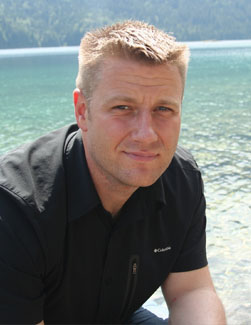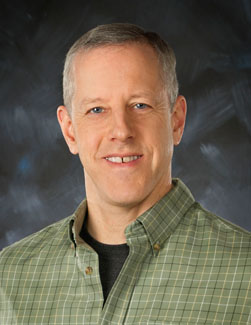American Corporate Partners Clears the Path to a Successful Transition by Connecting Veterans to Business Leaders
Navigating today’s job market is difficult enough. But when you’re also making the transition between a military and civilian career, it can be even tougher.
Army Reserve Staff Sergeant Sam Nichols says he was “pretty fresh” to the job market when returned from his last two years
on active duty in Iraq. “When my first job wasn’t a good fit, I honestly didn’t know what to do. There was no support, and I was blindly trying to figure out my job. I didn’t know if I should look at a different industry to find the right culture fit. I wasn’t even sure how to go about resigning. I felt like I was perpetually swimming upstream.”
“Eventually, you need to raise your hand and say, ‘Give me a better way to do this.’”

“When I took my first position, I didn’t choose it by thinking ‘I want to go into manufacturing.’ I just started doing it. Then I realized I have a lot of soft skills and people management skills that weren’t being utilized. Randy helped me navigate the market, explore options, and see how those skills can be relevant in a different environment.”
– Sam Nichols, Custom Machining Team Manager at Cummins Inc.and Staff Sergeant, U.S. Army Reserve
Nichols found the guidance he needed with American Corporate Partners (ACP), an organization that connects veterans with mentors from top companies like GE, IBM, Johnson & Johnson, MetLife, and many more to work on topics ranging from résumés and interviewing to industry specific professional development.
Over the course of a year-long mentorship, ACP’s mentors provide customized career development and networking assistance to those seeking to work in any field, from finance to human resources, engineering to manufacturing. Mentors are located all across the country, and paired to fit professional experience and area of specialty.
Nichols was paired with Randy Schwalich, principal engineer for codes and product safety/refrigeration at Whirlpool. Recently retired from the Navy Reserve, there was much of Nichols’s story Schwalich could relate to.
“When I left my active duty service in 1986, I didn’t have the kind of support and insight that this type of program provides. There were coworkers that trained me in my job, but no one was there to help me realize the pace is much slower or that decisions were made differently. There’s a lot of room for ad hoc collaboration and that isn’t the military model, so I wasn’t connecting well. That first year, I was physically anxious because I felt I should be doing more, connecting better. It affected my ability to say ‘I’m happy here.’
“When the protégé can relate to your personal story, they take what you offer to heart.”
When ACP launched in 2008, they had six corporate partners. Today, the organization has approximately 50 participating institutions supporting the program. From each supporting organization, mid- to senior-level professionals, some who are, themselves, veterans, volunteer to take on a protégé for the full year. Program participants like Nichols and Schwalich, who live and work in different states, meet via regularly scheduled calls and on occasion when there’s a question or acute need.

“I related to the approach Sam took to things because I had the same experience fresh out of the service.
Because we’ve made this connection, I can tell him, ‘This is what I’ve learned’ and share viewpoints to a situation he may not have considered. It makes our relationship a powerful career tool.”
– Randy Schwalich, Principal Engineer for Codes and Product Safety/Refrigeration
at Whirlpool, and U.S. Navy Reserve, Retired
“Sometimes the first call can be a little awkward,” says Schwalich. “But after that, it’s very easy to connect. These vets are reaching out because they recognize they need some help. Sam and I connected quickly, and we set three early goals. We’ve already reached one, and we’re nearing the end of the second already.”
“Working with Randy has been extremely helpful,” says Nichols. “When I was transitioning jobs, he gave me a lot of good advice on how to test the waters. I had simple questions, too, like how do I write a resignation letter and who do I give it to. It’s frustrating when you don’t have a handle on things like that. I’m confident that I know I’m in the right position now.”
“Today, we’re working toward other goals. To me, success means being as effective as possible as a manager and leader. Eventually, I want to be able to develop entry-level managers and we’ve been talking through how to get there and the timeframe for making moves that will lead to that. We have the same values and same approach to workforce management.”
More than 3,000 veteran protégés have benefited from ACP mentorship so far. For mentors like Schwalich, the effort is indeed satisfying.
“When Sam told me he had taken some advice and it provided some tangible results, it was extremely gratifying,” he says. “As a hiring manager, I view that as an asset of a good employee to be able to recognize when they need help and have the courage to ask for it. Our veterans are motivated to do so.”
ACP also hosts an online business Q&A community, ACP AdvisorNet, which connects veterans and their immediate family members with business leaders across the country.
Through an interactive and easy-to-use interface, veterans can ask questions about career development, employment, and small business; follow Q&A threads; and message users to initiate private conversations. The site is open to all current and former service members and their immediate families. Business leaders nationwide, looking to share their expertise and advice, can sign up as advisors. All users are able to see the professional and/or military backgrounds of other users, promoting an environment of accountability and trust.






